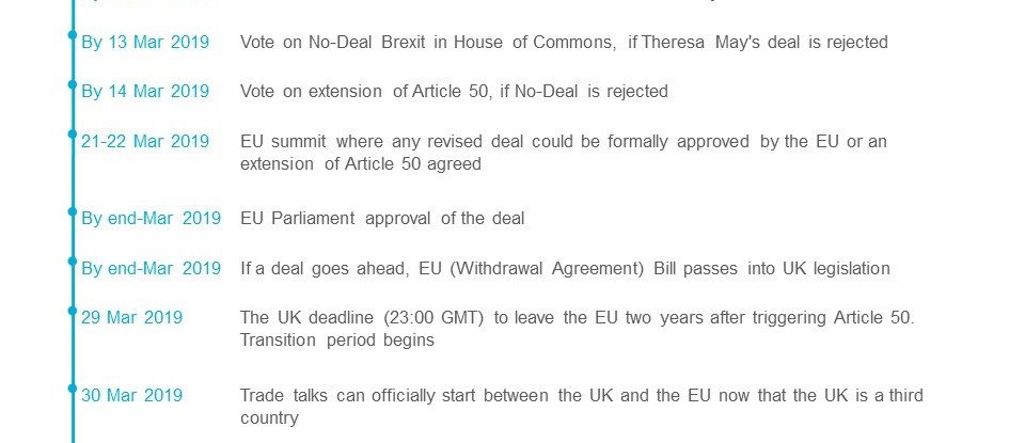With just weeks to go before the scheduled departure of the United Kingdom (UK) from the European Union (EU) on 29th March 2019, UK business and consumers are none the wiser as to whether the UK will be leaving with a deal or not. The first meaningful vote on Theresa May’s deal in January 2019 resulted in a record defeat in the House of Commons.
A second vote on a revised deal (it is hoped that the EU will give assurances to the UK regarding the controversial Irish backstop) is scheduled to take place by 12th March. This time, the direction of Brexit will finally become clearer as if the deal is rejected, MPs will be able to vote on a No-Deal by 13th March and then on an extension of Article 50 by 14th March, should No-Deal be rejected, effectively delaying Brexit. EU approval on the way forward will likely happen at the EU summit scheduled for 21-22 March.
Euromonitor International’s current baseline scenario for the UK centred on the November 2018 deal’s framework expects UK real GDP growth of 1.4% in 2019 and 2020, the slowest rate of economic growth since 2012.

Although opposition to Theresa May’s November 2018 deal has been significant in the UK parliament, no other alternative has managed to gain majority support, with Labour’s plans for a Customs Union also rejected. Significantly, Jeremy Corbyn has now put Labour’s backing behind a second referendum although this too does not seem to have parliamentary support.
Since the February 2019 update of Euromonitor’s Brexit scenarios, the chances of Brexiteers voting for Mrs May’s deal have increased, rather than risk parliament rejecting the No-Deal option, face a second referendum, or even No Brexit. Euromonitor’s probability of a No-Deal/Disorderly No-Deal Brexit has dropped to 20%, a baseline deal has increased to 42% and a Light/No Brexit to 38%, if pro-EU factions prevail.
It should be noted that even if a deal is secured in the coming week, the specifics of the future relations are yet to be determined. Uncertainty is likely to continue into the medium term in terms of what shape Brexit will take, effectively resulting in a Blind Brexit.
Euromonitor International’s Brexit Scenarios Tool includes three possible outcomes to help understand the range of impacts on the UK economy, industries and consumers:
A Free Trade Agreement/Customs Union baseline scenario, where the UK and EU reach an agreement on a Customs Union for goods, under either a Conservative or Labour government, at the end of a transition period in 2020.
A Light/No Brexit scenario includes the possibility of a Norway plus arrangement, or a second referendum, which results in staying in the EU. In this scenario, Euromonitor’s forecast for real GDP growth would increase to 2.0% in 2019 and 2020 (with Brexit effective from Q2 2019).
A No-Deal Brexit scenario follows a breakdown in negotiations and the UK leaving the EU without a deal and reverting to World Trade Organization conditions. If No-Deal has a more severe/disorderly impact, the UK would see two years of negative real GDP growth at -1.9% and -2.2% in 2019 and 2020 respectively (with Brexit effective from Q2 2019).
Source: Euromonitor Macro Model
Did you know: In a Light/No Brexit scenario
Economy: The UK would retain access to the Single Market, business investments would recover from the slow growth in 2016-2018 and consumer spending would rebound. Average annual real GDP growth would increase to 1.9% in 2019-2023.
Consumers: Thanks to greater certainty, the UK property market is expected to see increased activity and rising prices. The top consumer segment’s real spending on housing will subsequently grow by 33.6% during 2018-2023, 5.0 percentage points higher than the baseline forecast.
Cities: London’s high-income households will benefit from a Light/No Brexit and will add 102,500 more top segment households in this scenario compared to baseline forecasts in 2023.
Industries: An improvement in business sentiment in the packaged food industry would help maintain easy sourcing of key ingredients. As the UK would still apply European standards, new product launches would remain widely available across most European markets.
Find out more in our Quarterly Brexit Report for Q1 2019.
Euromonitor International’s Brexit Scenarios Tool helps clients to understand the impact of different scenarios on our baseline forecasts for the UK economy, industries and consumers. It offers a range of outcomes, providing the tools to stress-test strategy, plan ahead and remain profitable in these challenging times.
